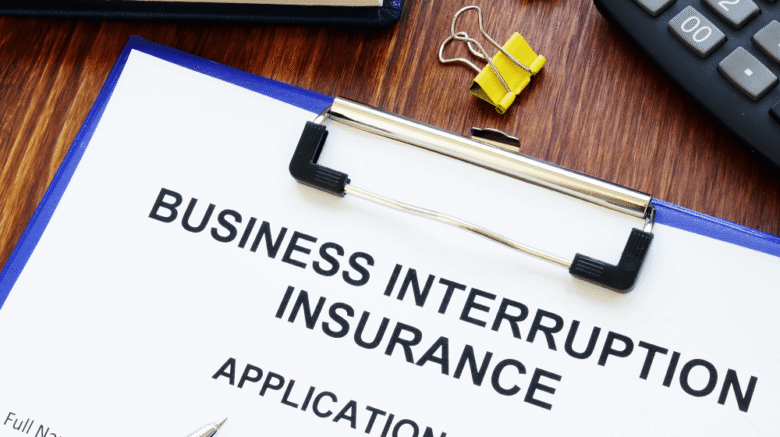Insurance for business interruption is a crucial protection for companies that is designed to protect their income from loss resulting from unexpected interruptions. Although general insurance policies focus on the repair or replacement of tangible assets, this particular coverage helps businesses keep their financial stability intact in the event that operations cease because of disasters such as natural catastrophes, fires or other risks covered. It is basically a safeguard for a company’s bottom line and allows it to rebuild its operations without enduring financial hardship.
Small business owners and large corporations alike Insurance for business interruption can be the difference between bouncing back with ease or suffering massive losses. The policy covers the revenue that could be made under normal circumstances together with fixed costs like payroll, rent and utilities.
Why Business Interruption Insurance Matters
Imagine the following scenario: a massive fire causes an establishment to close for a number of months. In addition to the physical damage that is covered by property insurance, the owner of the business faces enormous problems. In the absence of revenue, the business is at risk of falling into debt on lease or not being able to pay its employees. This is when insurance for business interruption comes in.
What makes this coverage so beneficial is the ability it provides to help companies recover quickly following an unplanned event. Through providing a financial buffer, this allows businesses to concentrate on getting back to activities instead of battling the increasing financial burdens. It also provides reassurance to employees, stakeholders and customers by demonstrating that the business is ready and resilient against the challenges.
Coverage Details
The exact terms of the business interruption insurance coverage may differ based upon the specific policy. However, most policies provide reimbursement for revenue lost, fixed operating costs and temporary relocation costs when a business has to relocate its headquarters. Certain policies might also provide protection for business interruptions that are contingent and address the loss of income resulting from disruptions to supply chains caused by a covered risk.
It’s vital to know that coverage typically starts after a waiting time that is commonly referred to as “the indemnity period”, which is defined in the policy. Furthermore, coverage is generally restricted to certain risks. It’s therefore essential to know what risks are included and if limitations apply to your business.
Real-World Examples
Many real-world examples highlight the importance of insurance for business interruption. For example, in the aftermath of Cyclone Harvey of 2017, numerous businesses across Texas were forced to shut down for a long time because of flooding and infrastructure destruction. Business interruption coverage was in a position to weather the storm by receiving prompt financial assistance to keep payroll and re-establish their operations.
Another incident goes back to the COVID-19 pandemic. There, the issue of business interruption claims came up. Companies that had policies which specifically excluded claims related to viruses have learnt the hard way regarding the policy’s limits and the fine print. However, businesses who had more extensive policies that had civil authority terms (for closures made through government mandates) had a good chance of claiming protection.
Factors Affecting Coverage
Many factors affect the price, scope and cost of insurance for business interruption. A significant aspect is the nature of the company and the inherent risk. For example, manufacturing plants that have heavy machinery usually face greater costs than an office-based consulting firm due to different operational risk factors.
The location of a company is also a significant factor, as businesses located in areas that are prone to natural disasters such as earthquakes or hurricanes typically receive higher rates. Furthermore, the length of the indemnity period that you decide to choose will affect the policy’s cost. A longer time frame provides more extensive financial protection; however, it can cause higher costs.
Integrating with Other Insurance
Business interruption insurance seldom stands by itself. It is compatible with other policies for commercial use, such as coverage for liability or property insurance. In general, it is an additional benefit to a comprehensive insurance policy. It is important that other policies are in line with your business interruption insurance to prevent any gaps.
For example, if an incident of fire results in physical damage to your property (covered by insurance on property), the business interruption insurance will help to pay for the losses you incur during that time. The alignment ensures that you are adequately secured from all angles, providing complete security.
Making a Claim
The process of claiming business interruption insurance involves proving the entire extent of your loss. Start by obtaining documents that show the financial loss that was caused, including the historical financial records, payroll statements, and other pertinent data. Additionally, you’ll need evidence of the event that could include photos or reports from police and fire departments.
It is essential to collaborate with your insurance company and make sure that all documentation is accurate. Some companies even seek the assistance of experts, such as public adjusters, who can ensure the accuracy of claims and maximise the amount of reimbursement. Fast and prompt action is crucial to avoid delay in receiving reimbursement.
Choosing the Right Policy
The selection of the best commercial interruption policy is based on understanding your business’s unique requirements and risks. Begin by looking at your revenues, expenses, and organisational structure. Think about the possible risks specific to your business and the location. For example, a company located in a coastal region might consider a higher priority for insurance coverage in the event of hurricane-related disruptions.
When you are comparing policies, pay attention to exclusions and indemnity options as well as the coverage limits overall. Talk directly to insurance representatives to resolve any doubts and ensure that you’re receiving an insurance policy that is tailored to your specific business needs.
Review and Update
The business environment changes, and so does your insurance policy. In the same way that your revenue and expenses, staff, or operational requirements alter, your policy needs to be able to change. Be sure to examine your insurance policy for business interruption every year and ensure that it is in line with the current needs of your business.
In the case of, for example, the case where your business has expanded to new areas and added new suppliers or has significantly increased its revenues, the policy may need adjustments. Be proactive to ensure that your policy reflects the actual needs of your company and prevents any gaps in coverage.
Final Thoughts
Business interruption insurance can be a lifeline for businesses, offering the financial security needed during tough times. It doesn’t matter if it’s natural disasters or fires; as well as unexpected closures, this crucial insurance ensures that businesses do not just survive but can thrive following disruption.
Don’t expose your business to the risk of the unknown. Review your needs, select the best policy, and work with an insurance company that you trust. Make sure to plan ahead today to protect your company’s future.
If you’re still unsure about business interruption insurance or would like to learn more about what it can do for your specific business, contact an insurance professional you trust. The business you run deserves the security it needs to grow, regardless of what obstacles come your way.
FAQs
1. What is insurance for business interruption protection?
Business interruption insurance typically will cover the loss of revenues, operating expenses (like rent and pay) and the cost of relocation after an event that is covered.
2. What kinds of events are covered under commercial interruption insurance?
The coverage is contingent on the policy but usually includes incidents like natural disasters, fires, and vandalism, as well as closures mandated by the government.
3. Is the cost of business interruption insurance high?
The cost of premiums varies based on the business size as well as location and risk; however, they are usually affordable and worth it when you consider the possibility of financial losses during interruptions.
4. Can small businesses profit from insurance for business interruption?
Absolutely! Whatever the size of the business, all businesses that may suffer a significant loss of income due to sudden closures could profit from this protection.
5. How can I pick the right policies?
Review your risk, revenue and operational requirements, and talk to an insurance specialist to come up with the best solution for your needs.




